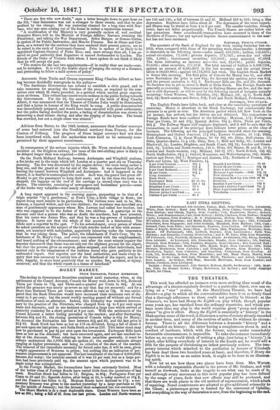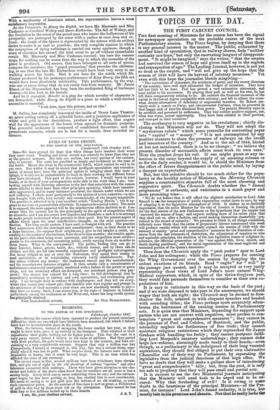THE THEATRES.
This week has afforded an instance even more striking than usual or the advantage of a theatre regularly devoted to a particular object, over one re- lying on a " star " system. At the Marylebone Theatre, we have had Hamlet—a play in which all the conventionalities have b-on so firmly fixed that a thorough adherence to them could not possibly be blamed: at the Princess's, we have had Henry the Eighth—a play which, though popular some years ago, has vanished from the ordinary repertoire, and which per- haps more than any play in the world requires great " pomp and circum- stance "to give it effect. Henry the Eighth is essentially a" history," in the Shaksperian sense of the word; it illustrates a series of events already recorded in another form, and many of the motives of action lie without its circum- ference. There is all the difference between a dramatic " history " and a play founded on history; the latter having a completeness about it, and a conduct of incidents, which with the former, unless under remarkably favourable circumstances, is impossible. To take the instance immediately before us, no one would think of' writing a play, (not being a " history,") in which, after killing everybody of interest in the fourth act, he would add a fifth for the purpose of christening an infant previously unborn. The tem- porary interest which attached to the prediction in honour of Elizabeth has been dead these two hundred years at least; and therefore, if Henry as Eighth is to be done as an entire work, it ought to be done in an Ullman* ing spirit. Now let us see how these two pieces have been done. Mrs. Warner, with a tolerably respectable Hamlet in the person of Mr. Graham, and with herself as Gertrude, looks at the tragedy to see what can be made of it; and although every movement in this most popular play has been defined by the usage of years, finds that new effects may still be produced, and that there are weak places in the old method of representation, which admit of repairing. Novel contrivances are adopted to give additional solemnity to the Ghost; a picturesque group is formed for the interment of Ophelia; and everything in the way of decoration is new, from the beginning to the sa.
With a mediocrity of histrionic talent, the representation leaves a most Satiaractory impression.
At the Princess's, in Henry the Eighth, we have Mr. Macready and Miss Cushman as Cardinal Wolsey and Queen Katharine. The fall of Wolsey, and the desolation in the mind of the proud man who learns the hollowness of his prosperity, are portrayed by the actor with a pathos at once deep and re- fined: the death of the Queen is represented by the actress with an evident desire to make it as real as possible; the very complete manner in which the conception of dying sufferings is carried out earns applause, though a want of elocution has caused the trial scene to go off without remarkable result. Mr. Macready and Miss Cushman succeed: but here the success stops, for nothing can be worse than the way in which the ensemble of the piece is produced. Old scenes, that have belonged to all sorts of pieces, compose the interiors; the "grand procession," that precedes the christen- ing, is one that the late Mr. Richardson would have been very sorry to see walking across his booth. Had it not been for the mirth which Mr. Cooper produced by his grotesque performance of King Henry, the fifth act would have been absolutely intolerable. This performance, by the way, was one of those things that do not easily fade from memory. Mr. James Bland, of the Haymarket, has long been the undisputed King of burlesque drama—let him look to his laurels.
And be it repeated, Hamlet is a play for which novelty of character is not demanded; while Henry the Eighth is a piece to which a well-devised ensemble is essential.
" Look here, upon this picture, and on this."



























 Previous page
Previous page